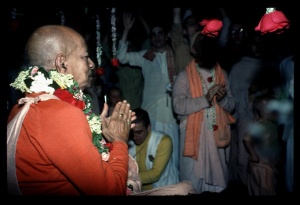SB 1.13.39 (1965): Difference between revisions
(Created page with "<div style="float:left">link=SB (1965) Thirteenth Chapter - Dhritarastra Quits Home '''SB (1965) Thirteenth Chapter - Dhritarastra Quits Home'''</...") |
(Vanibot #0020: VersionCompareLinker - added a link to the Version Compare feature) |
||
| Line 1: | Line 1: | ||
[[Category:Srimad-Bhagavatam (1962-1965) - Canto 01 Chapter 13]] | |||
<div style="float:left">[[File:Go-previous.png|link=SB (1965) Thirteenth Chapter - Dhritarastra Quits Home]] '''[[SB (1965) Thirteenth Chapter - Dhritarastra Quits Home]]'''</div> | <div style="float:left">[[File:Go-previous.png|link=SB (1965) Thirteenth Chapter - Dhritarastra Quits Home]] '''[[SB (1965) Thirteenth Chapter - Dhritarastra Quits Home]]'''</div> | ||
<div style="float:right">[[File:Go-previous.png|link=SB 1.13.38 (1965)]] '''[[SB 1.13.38 (1965)]] - [[SB 1.13.40 (1965)]]''' [[File:Go-next.png|link=SB 1.13.40 (1965)]]</div> | <div style="float:right">[[File:Go-previous.png|link=SB 1.13.38 (1965)]] '''[[SB 1.13.38 (1965)]] - [[SB 1.13.40 (1965)]]''' [[File:Go-next.png|link=SB 1.13.40 (1965)]]</div> | ||
{{CompareVersions|SB|1.13.39|SB 1965|SB 1972-77}} | |||
{{RandomImage}} | {{RandomImage}} | ||
| Line 6: | Line 8: | ||
==== TEXT No. 39 ==== | ==== TEXT No. 39 ==== | ||
<div | <div class="SB65verse"> | ||
Yudhisthira uvacha: | |||
Na aham veda gatim pitrorbhagavan kva gatah itah | |||
Amba ba hataputra arta kva gata cha tapaswini | |||
</div> | </div> | ||
| Line 15: | Line 17: | ||
==== ENGLISH SYNONYMS ==== | ==== ENGLISH SYNONYMS ==== | ||
<div | <div class="synonyms"> | ||
Yudhisthira uvacha—Maharaj Yudhisthira said, Na—do no, Aham—myself, Veda—know it, Gatim—departure, Pitror—of the uncles, Bhagawan—Oh godly personality, Kva—where, Gatah—gone, Itah—from this place, Amba—mother aunt, Ba—either, Hataputra—lost of her sons, Arta—aggrieved, Kva—where, Gata—gone, Cha—also, Tapaswini—ascetic. | Yudhisthira uvacha—Maharaj Yudhisthira said, Na—do no, Aham—myself, Veda—know it, Gatim—departure, Pitror—of the uncles, Bhagawan—Oh godly personality, Kva—where, Gatah—gone, Itah—from this place, Amba—mother aunt, Ba—either, Hataputra—lost of her sons, Arta—aggrieved, Kva—where, Gata—gone, Cha—also, Tapaswini—ascetic. | ||
</div> | </div> | ||
| Line 22: | Line 24: | ||
==== TRANSLATION ==== | ==== TRANSLATION ==== | ||
<div | <div class="translation"> | ||
Maharaj Yudhisthir said, 'Oh godly personality, I do not know where have my two uncles gone away; not only they but also my ascetic aunt who has lost all her sons and therefore much aggrieved, is also not traceable' | Maharaj Yudhisthir said, 'Oh godly personality, I do not know where have my two uncles gone away; not only they but also my ascetic aunt who has lost all her sons and therefore much aggrieved, is also not traceable' | ||
</div> | </div> | ||
| Line 29: | Line 31: | ||
==== PURPORT ==== | ==== PURPORT ==== | ||
<div | <div class="purport"> | ||
Maharaj Yudhisthir as a good soul and devotee of the Lord was always conscious of the great loss of her aunt and her sufferings like an ascetic. An ascetic is never disturbed by all kinds of sufferings and that makes him strong and determined on the path of spiritual progress. Queen Gandhari is a typical example of an ascetic by her marvelous character in many trying situations of her life. She was ideal woman as mother, wife and ascetic and in the history of the world such typical character of woman is rarely found. | Maharaj Yudhisthir as a good soul and devotee of the Lord was always conscious of the great loss of her aunt and her sufferings like an ascetic. An ascetic is never disturbed by all kinds of sufferings and that makes him strong and determined on the path of spiritual progress. Queen Gandhari is a typical example of an ascetic by her marvelous character in many trying situations of her life. She was ideal woman as mother, wife and ascetic and in the history of the world such typical character of woman is rarely found. | ||
</div> | </div> | ||
| Line 37: | Line 39: | ||
<div style="float:right">[[File:Go-previous.png|link=SB 1.13.38 (1965)]] '''[[SB 1.13.38 (1965)]] - [[SB 1.13.40 (1965)]]''' [[File:Go-next.png|link=SB 1.13.40 (1965)]]</div> | <div style="float:right">[[File:Go-previous.png|link=SB 1.13.38 (1965)]] '''[[SB 1.13.38 (1965)]] - [[SB 1.13.40 (1965)]]''' [[File:Go-next.png|link=SB 1.13.40 (1965)]]</div> | ||
__NOTOC__ | __NOTOC__ | ||
__NOEDITSECTION__ | |||
Latest revision as of 09:09, 25 May 2020

A.C. Bhaktivedanta Swami Prabhupada
TEXT No. 39
Yudhisthira uvacha: Na aham veda gatim pitrorbhagavan kva gatah itah Amba ba hataputra arta kva gata cha tapaswini
ENGLISH SYNONYMS
Yudhisthira uvacha—Maharaj Yudhisthira said, Na—do no, Aham—myself, Veda—know it, Gatim—departure, Pitror—of the uncles, Bhagawan—Oh godly personality, Kva—where, Gatah—gone, Itah—from this place, Amba—mother aunt, Ba—either, Hataputra—lost of her sons, Arta—aggrieved, Kva—where, Gata—gone, Cha—also, Tapaswini—ascetic.
TRANSLATION
Maharaj Yudhisthir said, 'Oh godly personality, I do not know where have my two uncles gone away; not only they but also my ascetic aunt who has lost all her sons and therefore much aggrieved, is also not traceable'
PURPORT
Maharaj Yudhisthir as a good soul and devotee of the Lord was always conscious of the great loss of her aunt and her sufferings like an ascetic. An ascetic is never disturbed by all kinds of sufferings and that makes him strong and determined on the path of spiritual progress. Queen Gandhari is a typical example of an ascetic by her marvelous character in many trying situations of her life. She was ideal woman as mother, wife and ascetic and in the history of the world such typical character of woman is rarely found.